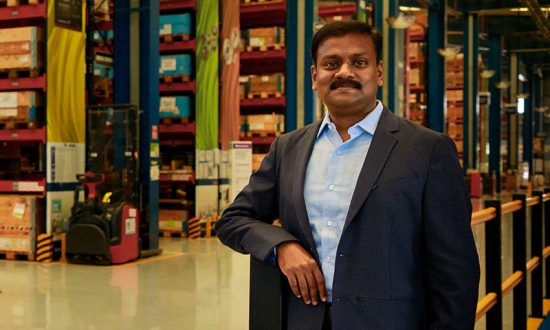Rajkumar has been associated with Grundfos India since 2001. During this time, he has held various positions in operations, customer support and supply chain in India, Singapore, South Africa and in South American countries like Brazil, Argentina and Chile. Since 2013, he has been involved in formulating new strategies for expanding the company’s foot print in India, including setting up a green field manufacturing centre in Ahmedabad, India. In his recent role at Grundfos, George Rajkumar was the Director Operations Strategy for the Asia Pacific Region. Rajkumar holds a Mechanical Engineering degree from Bharathidasan University.
When world leaders signed the 2015 Paris agreement, the commitment was to limit global warming well below 2 degrees Celsius. However, global emission rates are far from where they were planned to be in 2015. As a result, the Glasgow Climate Pact, an outcome of COP26 focused on furthering the agreements made in Paris to make the world more sustainable.
Today, while we have acknowledged the concerns around climate change and greenhouse emissions, a lot of work still needs to be done on the implementation of policies and programs to make the world greener. With this year’s theme of ‘Invest in our Planet’, the time is right to dial-up conversations around the need for strengthening investments from every stakeholder- government, corporates, and individuals.
We need initiatives that yields results and brings about a lasting change in our fight against climate change. Protecting our planet will begin with us and our willingness to act as a global community, focusing on the efficient management of resources and ensuring we limit and reduce our carbon and water footprints. Let’s ensure that commitments made on this Earth Day set the tone of intention for the whole year.
Preparing a sustainable framework
68.7% of greenhouse gas emission in India comes from the energy sector, followed by agriculture and industrial processes. Government is not the only stakeholder that needs to help a country achieve its climate goals. In a country like India, private organizations need to integrate the vision of ‘Net Zero’ in their business policies for a holistic approach on tackling the rising climate concerns as well.
Adopting a sustainability framework will help organizations meet sustainability standards across their business levels. From energy audits to replacing inefficient infrastructure, companies need to introduce robust and coherent processes for driving forward sustainable ambitions.
For instance, Bosch Automotive Electronics India, manufacturers of electronic control units for the motor trade implemented an energy audit of their cooling system at their Naganathapura plant. The objective was to reduce energy consumption and make operations greener and more energy efficient. As a result of the audit, Bosch began a pilot programme to assess the impact of replacing the cooling pumps with more power efficient alternatives. Two centrifugal pumps were installed providing a continuous water supply at a constant pressure. The energy savings have been considerable as power consumption has been reduced by 47% saving 4.42 kW per hour.
Truly investing in our future
Developing countries looking to further their economic progress are hugely dependent on natural resources to boost industrialization. As per a 2019 report, India extracts three times more natural resources than the global average for meeting the demands of a growing economy.
Safeguarding our natural resources with strategic interventions will truly fulfill the theme of ‘Invest in our planet’. Organizations need to embed circular economy principles within their production, products, and business models for effective management and utilization of resources. The objective is to explore how businesses can integrate more sustainable practices throughout their value chain, enabling them to reduce environmental footprint.
Demand for rare earth metals is skyrocketing and by 2030 it is projected to reach 315,000 tonnes . These rare-earth metals are irreplaceable in wind turbines, electric vehicles, mobile phones, computers and the defence industry. It is imperative to identify circular activities and projects from the design phase of products to manufacturing and reuse and recycling. The goal should be to reduce the amount of virgin raw materials in products and reclaim old products from the market to be remanufactured and reused. Rising demand combined with resource shortages and supply chain disruptions means we need to rely on sustainably mined and processed metals.
To address such issues, Grundfos has partnered with four organizations to lead a three-year EIT RawMaterials funded innovation project. The initiative is aimed to build a blockchain based Circular System for Assessing Rare Earth Sustainability (CSyARES), enabling companies to improve transparency and sustainability of their supply chains when it comes to critical and rare earth materials. This will also contribute to the circular economy transformation in the rare earth elements, electric and electronic equipment, automotive, and all other sectors that depend on rare earths.
Following the 4R principle of Reduce, Reuse, Recycle and Restore will act as a pillar of investment towards a more sustainable future. Industries can improve their water and climate impact through reuse, remanufacturing and recycling of materials. This will further help reduce the use of natural resources as well as lower the amount of greenhouse emissions.
Way forward with science based targets
Today, countries as well as organizations are embarking on the path towards sustainability. To achieve this, ambitious climate goals have been formulated. The need is to prioritize science-based targets that will help set up realistic expectations among stakeholders. This will further help businesses to lay the required foundation of ‘Investing in the future’ without compromising on their growth and product quality.
Outcome based initiatives will help governments and private organizations measure the positive impact of their sustainability initiatives. Such a move will help stakeholders to chart the future course of action accordingly.


